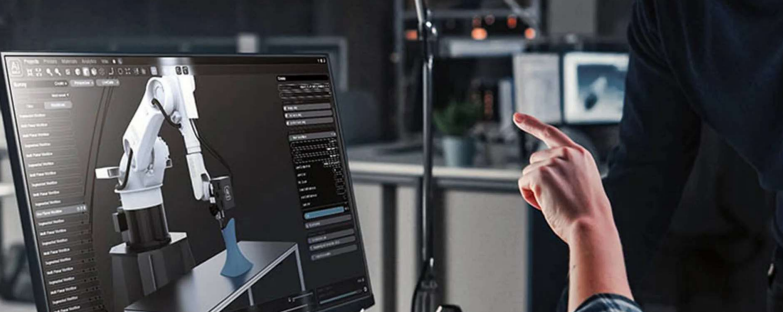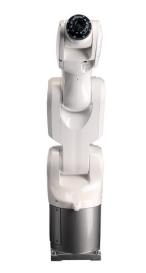UK-based software company Ai Build and KUKA Systems, a global automation company have announced the development of turnkey, integrated 3D printing systems named AMCell_ series.
The AMCell_small is the initial standardized cell iteration in the series. AMCell_small is primarily designed for the educational field, such as schools, universities, and corporate training facilities, where students can explore the fundamentals of automated polymer and 3D printing. AMCell_ has been effectively and economically packaged to assist the optimal delivery of sophisticated training methods in additive manufacturing principles, showcasing the KUKA KR AGILUS 10 R900, Ai Build’s additive manufacturing software AiSync, a non-planar extruder head, and periphery.
“Our approach is to enable the broad adoption of 3D printing, the key to which is the ease of use and repeatable outcomes,” said Daghan Cam, CEO, of Ai Build. “Our collaboration with KUKA on the AMCell aligns perfectly with that aim within a fully integrated, high-quality system.
“A small-scale, polymer 3D printing package aimed (initially) at the academic sector seemed the perfect fit for KUKA and Ai Build,” said Kevin Kolkea, Sales Manager – Robotic Joining and Additive Manufacturing at KUKA. “As an entry-level, standardized cell, our skilled 3D printing specialists of tomorrow can be trained in the operation of KUKA robots and become familiar with Ai Build’s additive manufacturing software AiSync and user interfaces.”

Functionalities of AMCell_ series
“Manufacturers, now, want the efficiencies that 3D printing affords, that correlate to cost savings, accelerated market entry, and enhanced product integrity. More importantly, they want access to skilled individuals, especially in the current labor climate, that can manage their process chains, within automated additive manufacturing,” added Kolkea.
The AMCell_ series, specifically the next cell generations of ‘_medium’ and ‘_large,’ will provide a completely autonomous ‘go-to’ solution for mass production in industries like automotive and aviation, satisfying demand-driven additive manufacturing requirements.
The AMCell_small will elevate the delivery of 3D printing in academia, which has traditionally relied on computer-aided design (CAD) data to print products using a 3D printer. KUKA believes technology packages such as the AMCell_ enable the delivery of much larger scale projects, the realization of efficiencies between creativity and technology, the acceleration of prototypes, and the development of flexible and scalable processes for the industry.
The completely integrated AMCell_ package allows students to begin manufacturing their own prototypes and products while saving institutions money on tooling, maintenance, and development. AMCell_ increases degrees of freedom in the 3D printing and plastic extrusion processes by employing preconfigured robots and AiSync software to meet individual needs with small print areas.
“KUKA has a well-earned reputation for quality engineering, and over many years Ai Build’s partnership with KUKA has been tested in many scenarios. We use KUKA robots every day in our AiLab and KUKA integrated with AiSync software has been successfully pushing AM boundaries in the world’s largest enterprises. We are delighted to have had the opportunity to collaborate with KUKA on the AMCell, which addresses a clear market need across academia and enterprise alike,” explained Cam.

Advancing additive manufacturing with production cells
Previously, 3D printer OEM, Stratasys showcased a novel fully-integrated 3D printing and post-processing platform, at Formnext 2022. The P3 Automated Production Cell from Stratasys includes a slew of Origin One systems, along with robotics, conveyors, and part-finishing equipment. Once prints are complete, the cell’s mechanical arm can collect and transport the applicable build plate to a built-in post-processing facility, which includes UV curing and drying functionality to wash, rinse, and cure them as needed. The setup, created in collaboration with Calvary Robotics, was originally intended to demonstrate how robotics can be used to drive down production costs and scale 3D printing.
Furthermore, additive manufacturing smart production cells developer Handddle announced a partnership with Massachusetts-based 3D printer manufacturer Markforged. The collaboration improves manufacturing resiliency by enabling on-demand industrial production by incorporating the Markforged Digital Forge with Handddle’s micro-factories platform and other production process management systems via an application programming interface (API). Dylan TALEB, Co-founder and COO of Handddle said, “Thanks to this collaboration, manufacturers will be able to rely on an integrated solution to develop their knowledge and control of production processes with data to further empower their production capabilities and reach the highest results while using their Markforged printers.”
Follow this link for all the Formnext 2022 news.
To stay up to date with the latest 3D printing news, don’t forget to subscribe to the 3D Printing Industry newsletter or follow us on Twitter, or like our page on Facebook.
While you’re here, why not subscribe to our Youtube channel? Featuring discussion, debriefs, video shorts, and webinar replays.
Are you looking for a job in the additive manufacturing industry? Visit 3D Printing Jobs for a selection of roles in the industry.
Feature image shows AMCell_small 3D printing system. Image via Ai Build.



